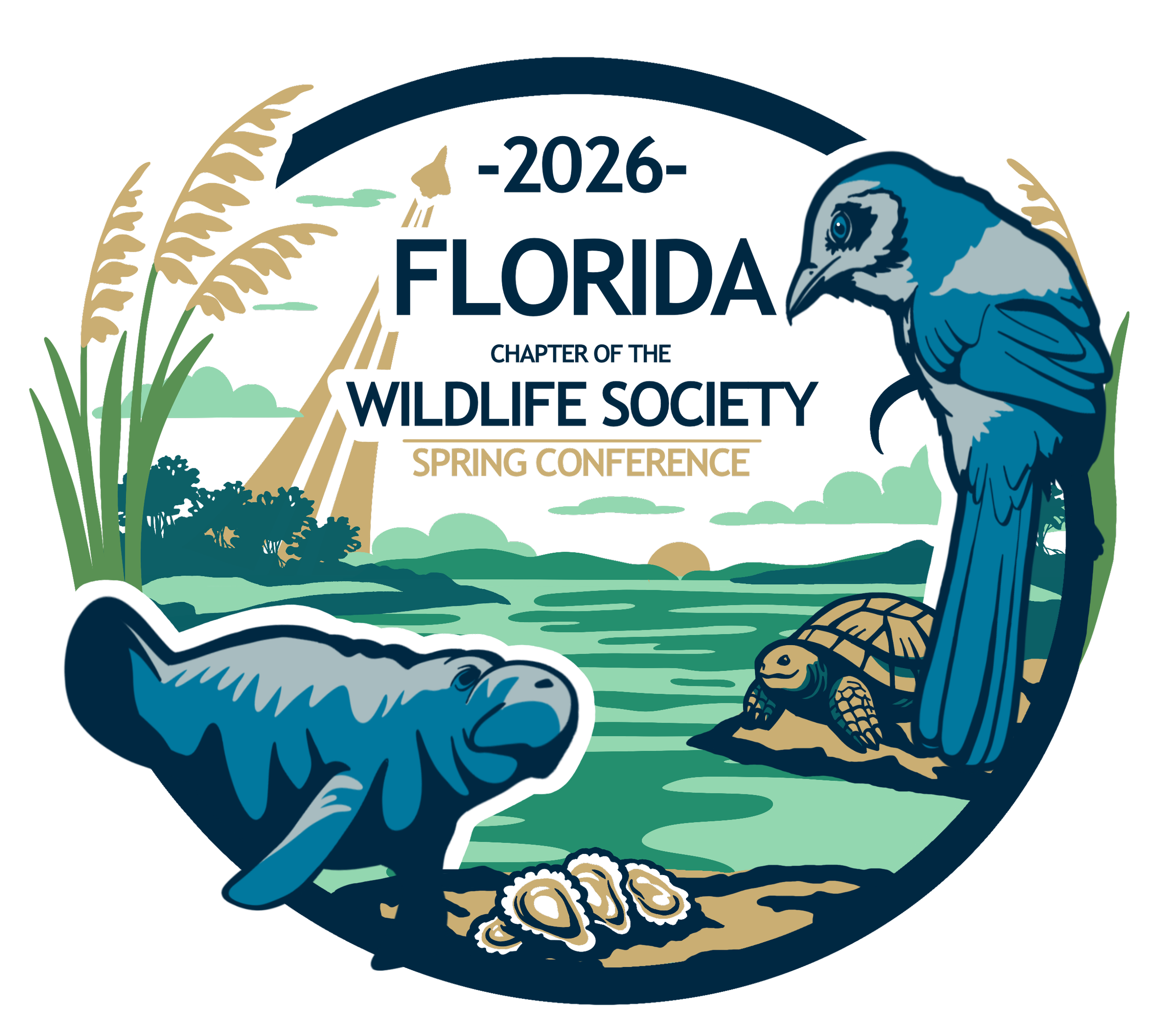FLTWS 2022 Spring Meeting
Thursday, March 24, 2022
VIRTUAL + FIELD TRIPS!
The annual Spring Meeting of the Florida Chapter of The Wildlife Society will be held virtually on Thursday, March 24, followed by optional in-person field trips around the state (limited to small groups).
The meeting theme is Wildlife Movement: Natural and Unnatural.
Keynote will focus on Wildlife Corridors and the Symposium on Translocations.
Registration is only $45 for non-members, $35 for members (use discount code MEMBER during checkout), and $10 for students (use discount code STUDENT during checkout).
PLEASE NOTE: Registration deadline for the conference and the field trips is March 21.
AGENDA
Thursday, March 24
8:00 - 8:45 Virtual Morning Coffee Social with 7 different discussion rooms you can mingle in:
Prescribed Fire
Transportation Effects on Wildlife
FLTWS Questions, Concern, Suggestions for the President
Birds
Herps
Bats
Mammals (other than bats)
9:00-12:00 Symposium: Translocation (ABSTRACTS)
Get the latest information on the translocation efforts for several species throughout Florida and then engage with our presenters during a lively panel discussion.
9:00–9:05 WELCOME AND INTRODUCTION TO TRANSLOCATION Karl E. Miller, Symposium Chair
9:05–9:25 POOR SURVIVAL OF CAPTIVE-REARED KEY LARGO WOODRATS RELEASED ON A CAT-FREE ISLAND Daniel Greene
9:25–9:40 SUCCESSFUL TRANSLOCATION OF THE FLORIDA SCRUB LIZARD IN PALM BEACH COUNTY Kevin Enge
9:40–10:00 EFFECTS OF TRANSLOCATION ON GOPHER FROG SURVIVAL AND MOVEMENT Traci Castellón and Anna Deyle
10:00–10:15 MONITORING THE SUCCESS OF GOPHER TORTOISE TRANSLOCATIONS IN FLORIDA Katharine Richardson
10:15–10:35 REINTRODUCTION OF BROWN-HEADED NUTHATCHES TO JONATHAN DICKINSON STATE PARK Jim Cox
10:35–10:55 A SUCCESSFUL NEW METHOD FOR TRANSLOCATING FLORIDA SCRUB-JAY FAMILY GROUPS Karl E. Miller
10:55–11:15 TRANSLOCATION OF CAPTIVE-BRED FLORIDA GRASSHOPPER SPARROWS TO AUGMENT A WILD POPULATION Juan Oteyza
11:15–11:35 RED-COCKADED WOODPECKER TRANSLOCATION HISTORY AND FUTURE POTENTIAL CHALLENGES Will McDearman
11:35–12:00 TRANSLOCATION: CHALLENGES AND OPPORTUNITIES Panel Discussion with Q&A
12:15-12:55 Lunch
Speed Networking in the Lunchroom – You will be randomly paired with a fellow biologist for 3 minutes, then off you go to meet someone else! Great way to meet new people you may not otherwise have felt comfortable walking up to. Awesome way to reconnect with old friends you haven’t talked to in a while.
1:00-2:00 Keynote Speakers: The Florida Wildlife Corridor
Join conservation photographer and National Geographic explorer, Carlton Ward, and the Florida Wildlife Corridor Foundation’s Chief Conservation Officer, Jason Lauritsen, for an update on the progress to safeguard the critical landscape connections that sustain Florida’s best wild places.
2:00-2:55 Awards Presentations and Business Meeting
3:00-5:00 Technical Session (ABSTRACTS)
3:00–3:15 Movement patterns of wading birds as a mechanism linking freshwater wetlands and coastal ecosystems in the Greater Everglades. A. R. Sharp, D. E. Gawlik, M. Petersen. (STUDENT)
3:15–3:30 Pervasive invasives: Florida range limits for two priority nonnative reptiles. H. Bevan and D. Jenkins (STUDENT)
3:30–3:45 Water-works? Effects of hydrologic restoration on the foraging behavior of the endangered Florida bonneted bat. L. P. Nicholson, E. C. Braun de Torrez, H. K. Ober (STUDENT)
3:45–4:00 Are some bats snowbirds? The summer origins of tricolored bats overwintering in Florida caves. L. M. Smith, J. A. Gore, T. J. Doonan, and C. J. Campbell.
4:00–4:15 Effects of translocation on American crocodile (Crocodylus acutus) movements and habitat use in South Florida. A. Brunell, V. Deem, C. Hackett, B. Bankovich, F. Bled, S. Farris, and F. J. Mazzotti
4:15–4:30 Efforts to reestablish a self-sustaining population of striped newts in the Apalachicola National Forest. R. C. Means and R. P. M. Means
4:30–4:45 Residential development and resource selection in urban Florida burrowing owls. E. H. White Rose and R. K. Boughton
4:45–5:00 A decade of population dynamics on two medium-sized Florida scrub-jay sites. M. Folk
5:15-6:00 Happy Hour!
Grab a beverage of your choice and chat with some of the biologists working in your local area. No topic, just an opportunity to find out what is happening in your neck of the woods (pun intended). Groups divided by region:
Northwest
North Central
Northeast
Central
Southwest
Southeast
FIELD TRIPS
In-person field trips will be held in small groups around the state to give members an opportunity to see some of the great projects going on within Florida’s corridors. This is also an opportunity to catch up with other members in person, in a safer outdoor setting than a large conference venue could allow. To minimize travel, trips are provided at a variety of locations. To minimize work and school conflict, trips are provided on a variety of days, including the weekends. A maximum of 10 people will be permitted per trip, with the exception of Archbold/Buck Island (min. 10, max 15). Pre-registration required, but there is no additional cost. Limit one trip per person. Summary of dates and times below, followed by detailed trip information.
Saturday, March 26
9:00-1:00 Bike Tour of the Cross Florida Greenway and Wildlife Corridor
Near Ocala (bring your own mountain bike)
9:00-Noon Striped Newt Repatriation Project 1-Mile Hike
Apalachicola National Forest, meet near Tallahassee
Friday, April 1
9:00-Noon Wetland Preserve Golf Cart Tour
Near Rice Creek Conservation Area in Palatka
Saturday, April 2
9:00-11:00 Apalachicola National Forest 4X4 Tour
Meet in Bristol (bring your own 4X4 truck or make plans to ride with someone on the trip that has one)
9:00-12:30 Swamp Buggy Tour of St. Sebastian River Preserve State Park – Fellsmere
Sunday, April 3
9:00am - 4:00 pm Archbold Biological Station and Buck Island Ranch
Morning tour of Archbold Biological Station, then buggy tour of Buck Island Ranch after lunch (bring your own lunch).
Field Trips:
Wetland Preserve. Friday, April 1st 9:00- Noon













